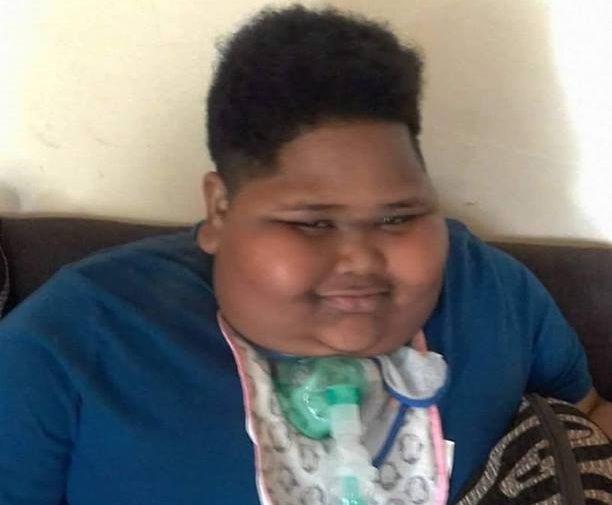
A morbidly obese South African boy with a rare condition which caused him to eat excessively died at a hospital in the city of Pretoria on Thursday aged just 11 years old.
Caden Benjamin of Mpumalanga province suffered from a Prader Willi syndrome (PWS)—a genetic disorder caused by missing or non-functioning genes in a single pair of chromosomes (thread like structures containing DNA, of which humans have 23 pairs.)
As is common in PWS sufferers, Benjamin developed an extreme appetite because his brain couldn't register when he was full, meaning he was always hungry. This led him to overeat and become obese. According to South African news outlet TimesLIVE, the child weighed 198 pounds (90 kilograms) at age 10.
His weight caused him to have major respiratory problems and he had to visit a physiotherapist just to help him breathe. Furthermore, he had an enlarged heart, diabetes, cellulitis, depression and weak muscle tone.
Benjamin wasn't even able to attend to school and spent the last year of his life hooked up to an oxygen tank and on medication. According to TimesLIVE, the boy dreamed of having a normal childhood and growing up to be able to drive a fast car.
Gila Sacks met Benjamin's mother, Zola, on Facebook and started a crowdfunding campaign last year in an attempt to raise funds for his care. Zola Benjamin had left her job to look after her son, but she did not have enough money for his medication or the three hospital visits that he required every month.
"Caden was her whole life," Sacks told TimesLIVE. "Although she knew his chances of recovery were slim, she is still devastated. She wants him to be remembered for the sweet, brave boy that he was."
Sacks has extended the crowdfunding campaign to help pay for Benjamin's funeral, which is set to take place on Saturday.
"I hope we can help his single mother to give Caden the funeral that he deserves," Sacks said. "Caden and his mother were never separated. Friday night was her first night without him. I would like her not to stress about finances during the immense grieving process."
Aside from poor muscle tone and feeding difficulties, other symptoms of PWS include short stature, developmental delays, cognitive impairment, and distinctive behavioral characteristics, such as temper tantrums, stubbornness, and obsessive-compulsive tendencies, according to the Genetic and Rare Diseases Information Center.
"Most people with PWS cannot live independently because they require strict environmental control to limit access to food," Susan Hedstrom, Executive Director of the Foundation for Prader-Willi Research, told Newsweek. "Individuals usually exhibit cognitive challenges, with measured IQs ranging from low normal to moderate intellectual disability. Those with normal IQs usually exhibit learning disabilities."
"Other issues may include growth hormone deficiency/short stature, small hands and feet, scoliosis, sleep disturbances with excessive daytime sleepiness, high pain threshold, speech apraxia/dyspraxia, and infertility," she said. "Behavioral difficulties may include obsessive-compulsive symptoms, skin picking, and difficulty controlling emotions. Adults with PWS are at increased risk for mental illness. PWS is a spectrum disorder and symptoms vary in severity and occurrence among individuals."
According to a spokesperson from the Prader-Willi Syndrome Association, PWS is thought to be present in 350,000 to 400,000 individuals worldwide and approximately 20,000 living in the U.S.
"It is currently believed that as high as 1/10,000 live births will be diagnosed with PWS and with 4,000,000 babies born per year in U.S., then one could estimate about 400 babies with PWS per year," the spokesperson said.
Most cases are not inherited and occur randomly. Management of the disease depends on the person's age and symptoms but people with PWS in the United States usually reach adulthood and are able to accomplish many of the things their peers do, albeit with a significant amount of support.
"Individuals need to have close medical supervision by their primary care and specialty providers familiar with the
complications associated with the disease," the spokesperson said. "The child with PWS requires multiple specialties
that include speech, physical, behavioral and occupational therapies. Adults with PWS frequently are part of group homes that support and maintain the aspects of treatment promoting independence. Obtaining and maintaining access to these providers is one of the greatest challenges for the families of individuals with PWS, especially when transitioning care from a pediatric to an adult provider."
"Due to food seeking and hyperphagia with subsequent obesity, if not controlled, it is difficult to maintain a normal life style without life-long supervision on food access," they said.
This article has been updated to include additional comments from Susan Hedstrom.
Uncommon Knowledge
Newsweek is committed to challenging conventional wisdom and finding connections in the search for common ground.
Newsweek is committed to challenging conventional wisdom and finding connections in the search for common ground.
About the writer
Aristos is a Newsweek science reporter with the London, U.K., bureau. He reports on science and health topics, including; animal, ... Read more
To read how Newsweek uses AI as a newsroom tool, Click here.








